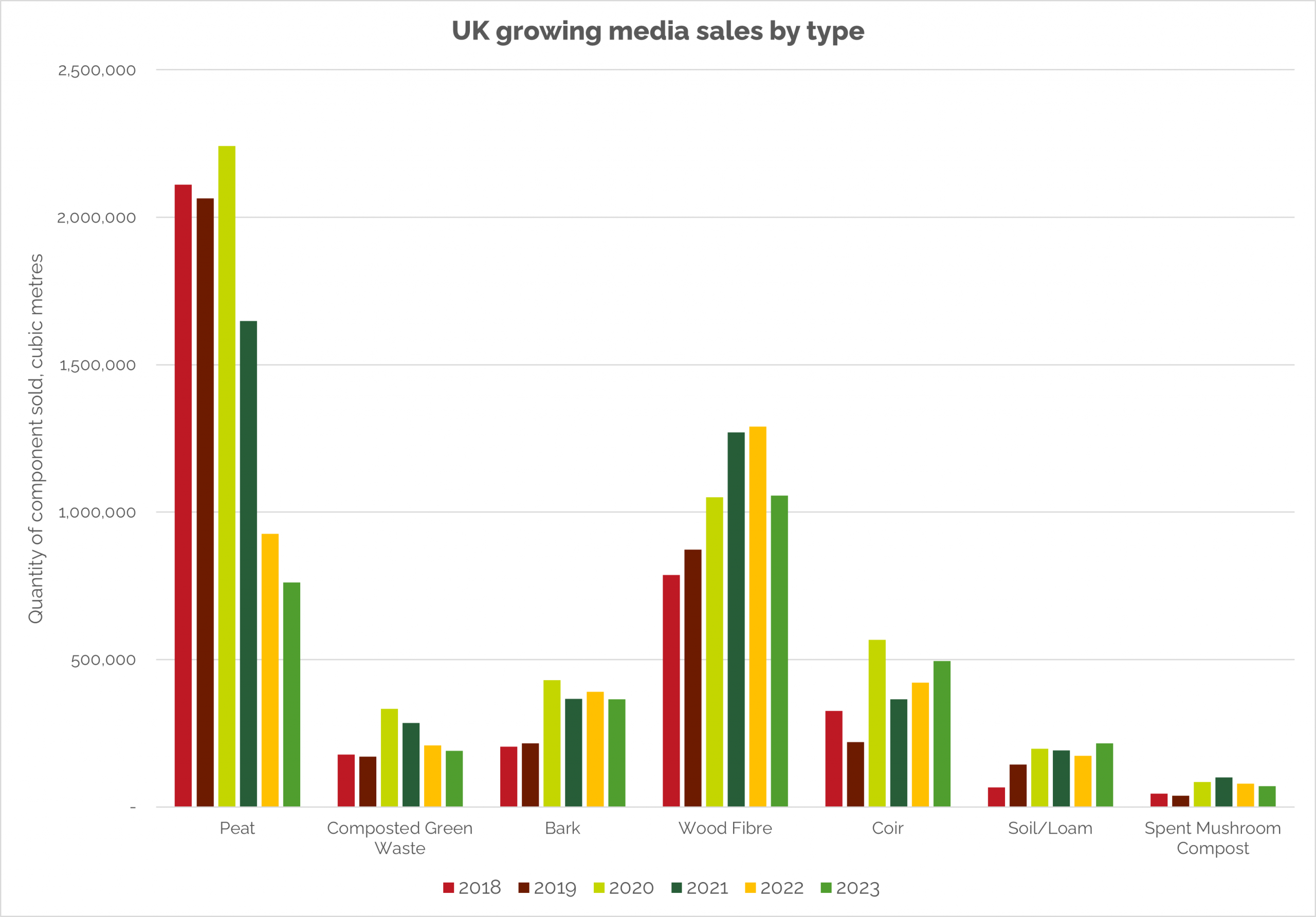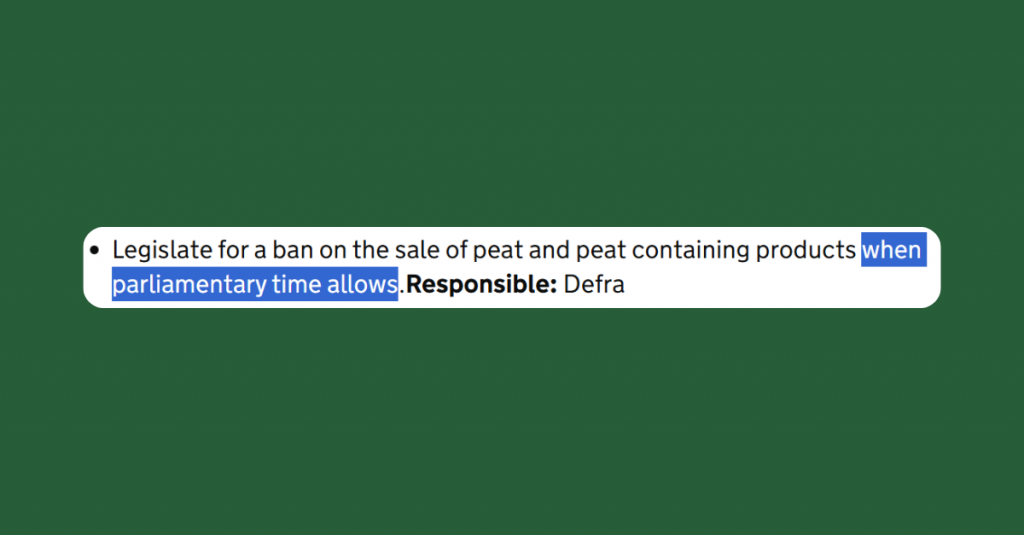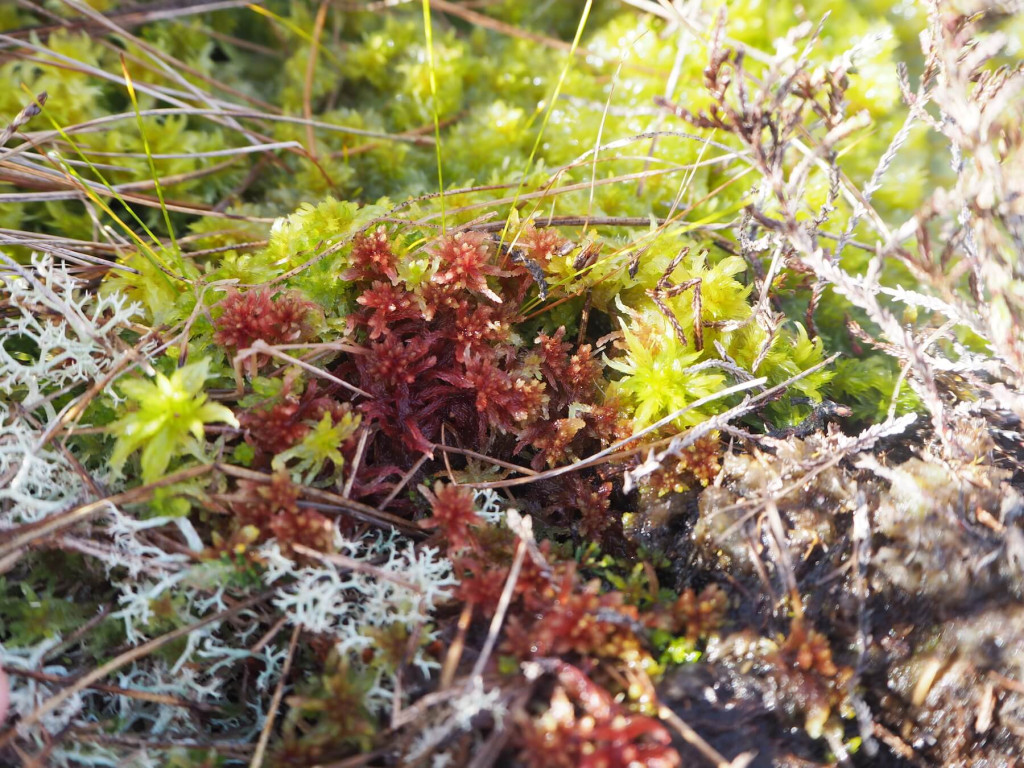Posted: 07/08/2025 • 5 minutes read
Silence on legislation stalls peat-free progress

We’ve been waiting a while: but at last, 16 months later than promised, the updated statistics for peat use in the UK horticulture industry have been released.
These are the figures on peat use for 2023: they’re so delayed that the stats for 2024 have already been collected, so we’ll look forward to their release soon too.
The 2023 statistics reflect progress towards peat reduction during the year when uncertainty first started to set in. The previous administration had promised, repeatedly, to legislate to end peat sales ‘by 2024’. But as 2023 wore on, there was no sign of a plan (let alone legislation), and in September the then Prime Minister Rishi Sunak announced he was rolling back previously set-in-stone net zero targets.
Peat legislation was beginning to look increasingly unlikely: and against this background of uncertainty and confusing messages, it’s perhaps no surprise that the UK horticulture industry’s confident, determined progress towards peat-free began to falter.
Progress stalled
The figures make for bleak reading. Here are the key statistics:
- Peat use in retail (bagged) compost reduced by 1% in 2022-2023
- Peat use for professional growers went down by 4% in 2022-2023
- UK horticulture is still getting through 760,000m3 peat every year – that’s enough to fill over 300 Olympic sized swimming pools.
By way of contrast: the previous set of statistics for peat use 2021-2022 showed a fall of 13% in retail peat use, and 8.4% for professional growers.

UK growing media sales by type. Wood fibre increases between 2018-2022 but shows a fall in 2023 accompanied by a relative slowing in peat reduction. Peat reduction 2021-2022 was much greater than 2022-2023.
It took just one year of indecision to undo decades of hard work by the horticultural industry. With the certainty generated by government commitment to legislation and a clear deadline to aim for, that work had accelerated massively: in fact peat use by UK horticulture more than halved, from over 2.2 million cubic metres of peat in 2020 down to just under 1 million by 2022.
Peat-free leaders
But now, as the unfulfilled pledges pile up and the current government merely repeats that it is ‘looking at next steps regarding measures to ban horticultural peat’ – all that determination has evaporated.
The clear direction, with a definite deadline, has given way to chronic business uncertainty and indecision that’s now eating away at the industry like a cancer. It’s no wonder progress has ground almost to a halt.
UK horticulture still leads the world when it comes to peat-free alternatives for growers: years of cutting-edge research are producing solutions which have overcome almost every difficulty, from mushrooms to carnivorous plants.
Developments here have driven faster progress to peat-free elsewhere in Europe too. It’s no coincidence that leading Dutch wholesalers from Rijnbeek to Syngenta are now offering ever-expanding ranges of peat-free plug plants to growers.
Back British horticulture
Many growers made the decision to transition earlier than the 2024 deadline, in good faith, as a wise business move: and they managed it with style. They did it all under their own steam, investing their own time, money and resources without support or encouragement from government – because it was the right thing to do. You can watch some of these success stories in our ‘Hort Shorts’ video series.
But now, with still no sign of the promised legislation from government, these peat-free pioneers can’t capitalise on their investment, as their superbly produced, peat-free, UK grown plants are continually undercut by cheap, peat-grown imports. Legislation would allow only peat-free imports – creating a level playing field for all.
The horticulture industry cannot make the move to peat-free on its own, without support or backing from government through legislation – and nor should it have to.
UK horticulture is crying out for government to get behind it with some clarity, firm deadlines and an end to the uncertainty, so it can get on with the transition away from peat with confidence and determination. Only clear, fair legislation from government can provide that: and as these disheartening 2023 peat use statistics show all too clearly, the sooner, the better.




